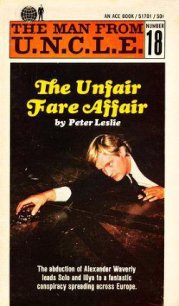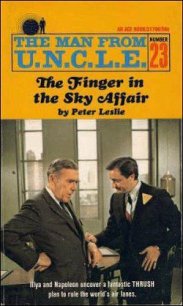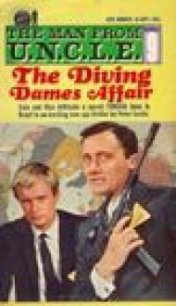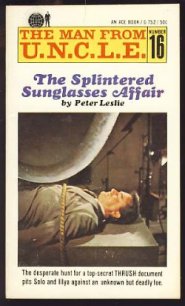The Radioactive Camel Affair - Leslie Peter (е книги txt) 📗
“Passable.”
“Good. You’d better be a pilgrim, though. They keep to themselves and hardly speak on these jaunts. You might be faulted on accent otherwise.”
“A pilgrim! Where to, for Heaven’s sake?”
“There’s a sect that beetle off to some shrine just north of the Congo border every couple of months. They go with the trade caravans for safety’s sake.”
“And there’s a party of them in our caravan?”
“So I believe. In any case, that’s the only way you could join without comment.”
“How d’you mean?”
‘Well, I’m afraid the only way it can be done is to substitute yourself for some joker who’s already signed on, as it were. They can’t be bribed; they’re much too religious. But there’s a certain police captain who can be bribed—and the drill is, you get a set of papers to match some chap’s who’s already on the list…and then the police captain runs the chap in on some pretext and keeps him in custody until the caravan’s gone. Meanwhile, there you are in his place.”
“It seems a trifle rough on the chap,” Solo said dryly.
“Yes, well, it’s a pity; but they let him go after a couple of days anyway. Too expensive to feed them in jail...They’re used to incomprehensible police behavior in this part of the world,” Marshel said apologetically. “I’m afraid it’s the only way.”
“I’d rather do it without putting some innocent man in jail—even for a couple of days.”
“Well, leave it to me. I’ll see what I can fix.”
“All right. And you know someone who can get me to the right place at the right time—and the right caravan?”
“Oh, yes. It’s some way south of the city. We’ll get you there. Can you—er—can you ride a camel?”
“If pushed.”
Marshel gave a faint smile. “Sometimes the camel needs pushing too.” Then his face sobered. “I should warn you that, if you’re discovered—ah—impersonating a pilgrim, the consequences can be deuced unpleasant. These Arab johnnies are very strong on religion—the accursed infidel and all that, you know. You’d have to leg it like hell for the bush.”
“I’ll have to worry about that when it happens.”
“Quite. I just thought I’d mention it.”
“One other thing: I lost my gun in that fracas at Casablanca—and my holster was carved to ribbons. We have plenty of other little devices, but I’m short of a pistol of some sort. Can you fix me up?”
“I could let you have a Mauser. It’s blasted heavy, but it’s quite a handy thing. Probably improvise you a holster, too.”
“Great. And I’ll keep in touch with you by radio. Our little battery transmitters are far too weak to reach home, of course: you’ll pass on my messages to Waverly in the normal way.”
“Yes, can do.”
“Okay,” Solo said. “‘Here’s to the great illusion!” He raised his glass.
Three miles away, on the other side of the city, in a shuttered villa behind tall hedges of tamarisk, Illya Kuryakin was ushered into a study furnished in ornate luxury. The man at the glass-topped desk was lean and dark, a hairline moustache emphasizing the chiseled planes of his mouth. Above his head, a huge horizontal fan revolved slowly in the hot, dry air.
“Solo?” he said, glancing at the card Illya had handed in. That’s an unusual name, monsieur.”
“It is an old Russian name,” Illya said unblushingly. “From the province of Khirgiztan, originally.”
“And the given name which precedes it—especially unusual for one of your nationality, I imagine?” Hassan Hamid said in Russian.
“In memory of my great-great-great grandfather, who commanded one of the units of the Imperial forces instrumental in defeating the French dictator after the burning of Moscow in 1813,” Kuryakin said in the same language. “I perceive from your accent that you learned your Russian in Leningrad.”
Hamid smiled. “You will forgive me, monsieur.” He said smoothly, returning to French. “In my position one is at times at the mercy of imposters. One likes to be sure of those with whom one deals.”
“Naturally.”
“I may say that I do not usually receive persons unknown to me personally. However, since you mentioned the name of—shall we say a mutual friend?—of great eminence, and since, to be honest, your own name intrigued me, I make an exception.”
“It is an honor to receive such flattering consideration from a highly-placed person,” Illya said fulsomely. “And in particular that he should allow himself to be intruded upon at home.”
“There are certain…transactions…better approached in the informality of the home, monsieur.”
“Precisely.”
“Touching upon which, in what way may I assist you, Monsieur Solo?”
“I have a desire to visit the southern part of your agreeable country.”
“Indeed? May one ask why?”
“It is said that there are certain mineral deposits,” Illya said carefully, “to the south and west of the El Marra massif. It appears, moreover, that these might be well worth exploitation by those with practically unlimited resources. The lignite veins, for example, are said to be by no means as poor as the reference books would have us believe. The bauxite, too, is of interest to those requiring aluminium…to say nothing of more—er—esoteric ores.”
“And you represent such an interest?”
“I do. Those cooperating with my gov—with my principals would find themselves well rewarded. There is a great deal of money involved. A very great deal.”
Hassan Hamid leaned back in his steel and leather chair. His tongue flicked once rapidly around his well-shaped lips. “Your—ah—principals have charged you with the task of verifying these reports?” he asked.
“Yes. I imagine I need not elaborate?”
“No, no, no. Indeed not. But, in this exploratory stage, how can I help you?”
“I understand there is a certain amount of dissidence in the area. I would not wish, during my researches, to run afoul either of rebels or of your efficient troops policing the region. Apart from which, in the normal way, I imagine you would scarcely welcome strangers there.”
“There are one or two cutthroat bands of renegade blacks,” Hassan Hamid said carelessly, flicking a speck of dust from his lapel. “We Muslims in the north are continually being misrepresented by the backward Negroes of the south. Agitators are sent in to stir up trouble, and the poor fools fancy themselves exploited. But there is nothing which could be called a rebellion power…Nevertheless, it is true that a foreigner wandering there could run into trouble.’
“Yes. And since it was not considered desirable at this stage to make an official approach at governmental level, I am here to ask your help in the granting of some form of laissez-passer which would at once justify me, justify my existence in that area, and assure those whom it might concern that I was under your protection, as it were.”
Hassan Hamid rose from behind the desk, moving elegantly across the room to a large wall map flanked by a coat of arms and the Sudanese flag. “I gather the areas in question would be, roughly, here…and here and perhaps here?” he said, tapping the map with a manicured finger.
“Yes,” Illya said. “Would you care for a Russian cigarette?”
“Thank you, I do not smoke. Please do so yourself, if you feel inclined.”
Kuryakin murmured his thanks and placed one of the brown cardboard tubes between his lips. He seemed to have some trouble in manipulating the heavy bronze lighter: it took several attempts before the spark produced a flame.
Hamid was waiting politely by the map, tapping his teeth with a gold pencil. “Yes, I think that can be arranged,” he said at last when Illya’s cigarette was drawing properly. if you could go tonight to the police station at this address”—he moved back to the desk and scribbled a few lines on a sheet from an ivory framed memo pad—”the necessary documents will be waiting for you. Please take your passport to identify yourself. The staff will themselves take your photograph and attach a copy to the papers just to ensure that the right person gets them, you understand. And you should also present this…” He wrote something on a second memo sheet, tore both sheets from the pad, and handed them to lllya.




![[The Girl From UNCLE 04] - The Cornish Pixie Affair - Leslie Peter (электронная книга .txt) 📗](/uploads/posts/books/56865/56865.jpg)